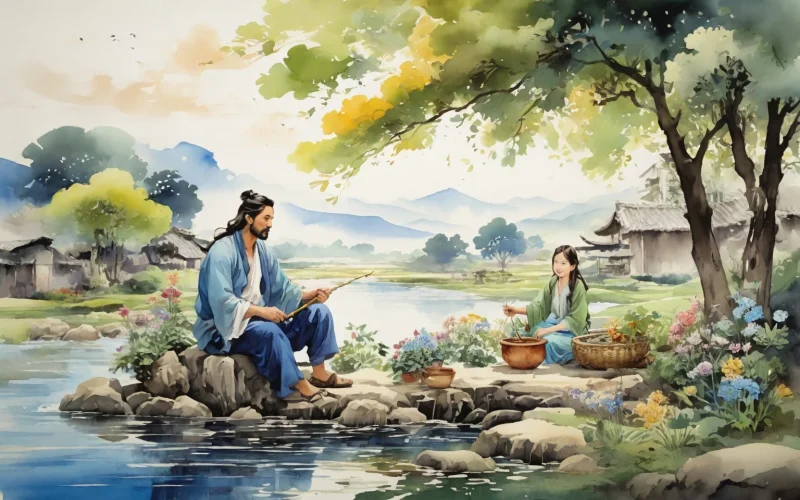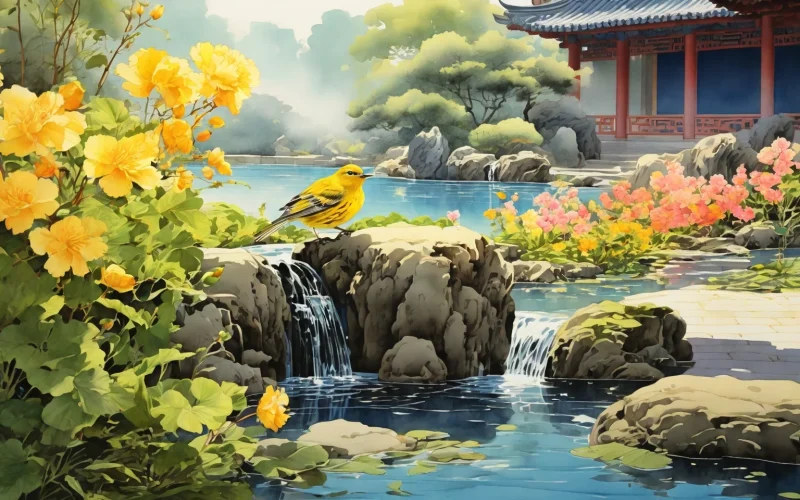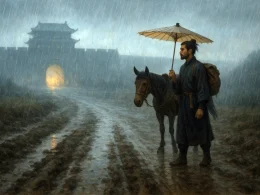Who knew beyond white clouds’ veil,
Spring lingers where green vines prevail?
Moss-kissed paths trace the brook’s bend,
Blossoms shroud the cave-dweller’s end.
His free-spirited wife tends herbs with grace,
His young boy joins him by the fishing place.
Those Ying River hermits fleeing Yao’s reign—
Could they match this truth-nurturing plain?
Original Poem
「题温处士山居」
钱起
谁知白云外,别有绿萝春。
苔绕溪边径,花深洞里人。
逸妻看种药,稚子伴垂纶。
颍上逃尧者,何如此养真。
Interpretation
This poem was composed during the High Tang period as an inscription after Qian Qi's visit to the mountain retreat of his recluse friend, Master Wen. Living in seclusion among the hills, Master Wen cultivated medicinal herbs, fished, and enjoyed tranquil family life. Deeply moved by this lifestyle during his travels, Qian penned the poem to express admiration while voicing his own yearning for reclusion and transcendence beyond worldly concerns.
First Couplet: "谁知白云外,别有绿萝春。"
Shéi zhī bái yún wài, bié yǒu lǜ luó chūn.
Who knew beyond those rolling clouds,
A springtime of green vines lay hidden?
The opening rhetorical question marvels at the retreat's secluded serenity. "Beyond clouds" (白云外) marks its remove from worldly bustle, while "green vines' spring" (绿萝春) symbolizes the evergreen vitality and quiet beauty of hermetic life.
Second Couplet: "苔绕溪边径,花深洞里人。"
Tái rào xī biān jìng, huā shēn dòng lǐ rén.
Moss carpets the brookside path;
Flowers shroud the cavern-dwelling sage.
This couplet paints nature and habitation in harmony: moss, streams, and blossoms frame an ethereal sanctuary, while "cavern-dwelling sage" subtly elevates Master Wen's transcendent presence without direct description.
Third Couplet: "逸妻看种药,稚子伴垂纶。"
Yì qī kàn zhòng yào, zhì zǐ bàn chuí lún.
His serene wife tends medicinal plots;
His young child joins him casting lines.
The domestic scene radiates unforced simplicity—herbs embodying physical cultivation, fishing representing spiritual nurture. Together, they manifest the Daoist ideal of "nourishing authenticity" (养真) through unity with nature.
Fourth Couplet: "颍上逃尧者,何如此养真。"
Yǐng shàng táo Yáo zhě, hé rú cǐ yǎng zhēn.
That fugitive from Yao on Ying's shores—
How could he match this authentic way?
The finale invokes the legendary recluse Xu You, who fled Emperor Yao's offer of rulership by washing his ears in the Ying River. Yet Qian contends that Master Wen's embodied harmony—cultivating life rather than merely rejecting society—better realizes true reclusive wisdom. The philosophical turn lingers like mountain echoes.
Holistic Appreciation
"Inscribed for Recluse Wen's Mountain Dwelling" opens with the striking line "Who knows beyond the white clouds?"—immediately emphasizing the dwelling’s transcendent seclusion and hidden serenity. Through layered depictions of mountain scenery, daily life, and subtle allusions, the poet constructs an idyllic portrait of Wen’s family in reclusion. Unlike typical hermit poetry that merely celebrates nature, this work elevates the "cultivation of authenticity" (养真) by portraying the quiet rhythms of three lives intertwined. The closing allusion, seamless and profound, elevates the poem into a statement on rejecting fame and embracing the recluse’s ethos.
Artistic Merits
- Rhetorical Opening, Immersive Hook: The question "Who knows…?" draws readers into the hidden world, enhancing the poem’s enigmatic beauty.
- Vivid, Organic Detail: Lines like "Moss winds along the creek-side path" (苔绕溪边径) and "His free-spirited wife tends herbs" (逸妻看种药) are richly visual, blending human presence into the landscape.
- Scene-Philosophy Fusion: Beyond lyrical description, the recluse’s lifestyle embodies "nurturing authenticity," reflecting Tang scholars’ ideal of self-cultivation.
- Allusive Climax, Effortless Depth: The modest comparison to the legendary hermit Xu You (许由) deepens the poem’s resonance without pretension.
Insights
More than a mountain idyll, this poem is a meditation on living. Through Wen’s family, the poet envisions an ideal—"returning to simplicity, clarifying purpose through detachment." The tranquil yet vibrant woods, the couple’s indifference to fame, and their tender kinship stir longing. It whispers: amid worldly chaos, guard the初心 (original heart) of "cultivating authenticity," preserving an inner sanctuary untouched by vanity or ambition.
About the Poet
Qian Qi (钱起, c. 722-780), a native of Huzhou, Zhejiang, was the foremost of the "Ten Talents of the Dali Era" in mid-Tang poetry. His poetic style, inheriting Wang Wei's legacy, excelled particularly in regulated verse (五律), characterized by its ethereal elegance. Yan Yu praised his work as "innovative in form," reflecting the Dali period's transition from the High Tang's naturalism to refined craftsmanship.










